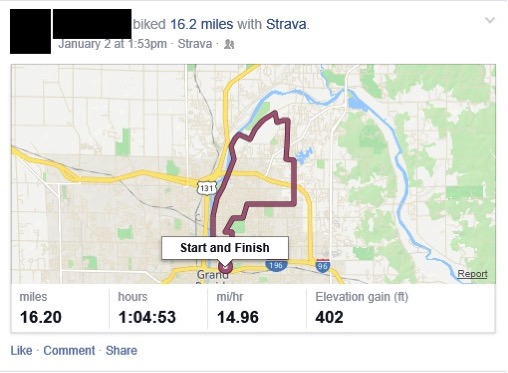Scenario: Your friend Sarah was recently in a car crash that crushed her right leg resulting in permanent injuries. Sarah was not at fault in the accident and hires a Michigan attorney to pursue a claim against the at-fault driver (Michigan-No-Fault third-party claim). In the lawsuit, she seeks reimbursement for her harms and losses, including (a) long-term wage loss because she cannot return to her career in retail sales (e.g., she cannot stand for more than a few minutes), (b) cannot play with her three young children, and (c) cannot do recreation activities she enjoyed including running, biking, and downhill skiing.
Two months after the lawsuit starts, Sarah posts her Strava biking activity on Facebook:

A few weeks later, Sarah posts one of her favorite photos with her daughter on Instagram:

Early in the lawsuit, the defense lawyers for the at-fault driver reveal they “have photographs and other evidence” proving Sarah’s damages are not significant, refuting what “the plaintiff trial lawyers” claim. The defense lawyers stumbled onto Sarah’s open and unrestricted Facebook and Instagram accounts, finding and copying her posts of biking 16.2 miles and photographs having fun after the lawsuit was filed. The defense will use Sarah’s own words and photographs to minimize or defeat any reimbursement, arguing the entire claim is exaggerated or faked.
Social media is now part of daily life. 1.7 billion people have active social media accounts. Social media websites include:
Facebook – the most popular online social network with 1.4 billion users worldwide. People use the site to publicly chronicle their daily events.
Twitter – also a popular online social network. Users send and read public messages, called “tweets,” not exceeding 140 characters. Users post over 500 million tweets every day.
LinkedIn – a business-oriented online social network. Most defense lawyers, insurance adjusters, and insurance investigators have LinkedIn accounts and routinely and anonymously view injured peoples’ profiles searching for incriminating information and evidence to deny claims and defeat lawsuits.
Pinterest – an online social network where users share visual information, photographs, and videos of hobbies and interests. A posting is called a “pinning.” Defense lawyers use a post by an injured person at trial to show a jury the plaintiff enjoys hobbies, convincing jurors to reduce or deny reimbursement for harms and losses.
YouTube – a video-sharing website and the second-most-popular search engine. A posted video showing the injured person doing physical activities he or she claims in a lawsuit that are difficult after an accident will defeat any reimbursement claim.
Google Plus – an online social network with many tools and features, such as Picasa photo. Google Plus is gaining popularity with individuals, interest groups, and businesses.
Tumblr – an online social network where users post photos, videos, and other information to a short-form blog.
Foursquare – a mobile app for local searches and information. Users “check-in” when they visit locations, including restaurants, bars, gym, public events, or activity centers.
These are only a few of the popular online social media sites defense lawyers and insurance companies search and monitor frequently during a personal injury claim. The posts are admissible in court and damaging evidence against the injured person. While many believe private posts remain private, defense lawyers demand and by court order obtain even your private posts.
So, how do you protect yourself?
If you are ever a plaintiff in a personal injury claim, honesty is the only acceptable policy. Never claim injuries you don’t have or work loss you didn’t need to miss. Exaggeration and false claims are wrong and always discovered. Even with no social media, insurers and experienced defense lawyers will find evidence claims are inflated or false.
If you are seriously injured in an accident and seek reimbursement in a personal injury claim, here are recommendations to protect yourself if you absolutely insist on continuing to use online social media:
While taking these steps will not keep defense lawyers and insurance companies from finding information about you, it may limit the discovery of negative evidence. The best course is to close and remove postings from all social media accounts until your claim concludes.
If you have a question, we want you to contact us at Buchanan Firm PLC (800) 272-4080.